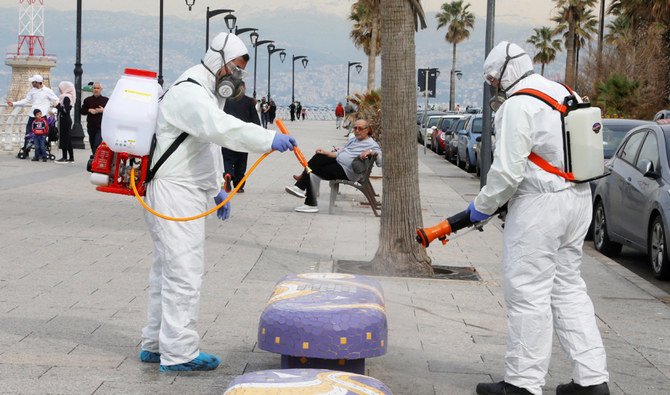
- ARAB NEWS
- 19 Apr 2024

Najia Houssari
BEIRUT: The Lebanese Armed Forces Command on Friday debunked reports about soldiers being quarantined, after they were reportedly found to be infected with coronavirus
“There are no corona reports in the military ranks, and the necessary preventive measures are in place,” the army leadership confirmed.
The statement came after social media and local online news sites reported about the virus being infected by military personnel.
The government has meanwhile decided to extend the closure of schools until the date of March 14. At a meeting held on late Friday, the committee on coronavirus also decided to close entertainment and sports centers, like sports clubs, nightclubs, cinemas, exhibitions, theaters and conferences, and has asked all the citizens to avoid crowded places.
The number of people infected with coronavirus in Lebanon has increased to 22.
A Lebanese woman who came from the UK was found to have contracted the virus, according to the Ministry of Health, which reiterated its call on all “individuals coming from countries experiencing cases of infection with the virus to confine themselves in their homes and to contact the ministry’s hotline designated to this matter upon exhibition of any symptom related to infection with coronavirus.”
Health officials fear that Lebanon might move from containing the virus to dealing with the spread of the disease.
Minister of Health Hamad Hassan said coronavirus had “not yet reached the stage of spreading.”
However, a surveillance official at the ministry said it “needs more health monitors to carry out the task of monitoring arrivals to the country, specifically on land crossings.”
On Wednesday, the first case of infection was detected in a Lebanese businessman coming from Egypt. He was transferred to a Lebanese medical center in Jbeil. His arrival sparked panic in the region.
Another case was recorded in the town of Chakra in southern Lebanon. A man who was in Iran and returned to Lebanon last week contracted the virus.
Medical sources told Arab News: “The fact that the number of infected people reached 16 does not mean that the virus has gone out of control. Lebanese people must adhere to the preventive measures broadcast on all media including social media.”
Rafik Hariri University Hospital in Beirut, which is designated to receive cases of coronavirus, said its emergency department received 74 suspected cases on Thursday.
It added that they were all examined, and that 25 cases were confined in the hospital; the others were asked to abide by home confinement.
The hospital’s report added that out of the 52 cases subjected to laboratory tests, only one proved positive.
The report indicated that 19 people who were in confinement in the hospital have already left after laboratory tests proved them negative, however, they were recommended to home confinement, and that there are 19 other cases who are still in confinement in the hospital.
The Iranian patient remains in a critical condition, “while the others who contracted the virus are in stable condition and are receiving the necessary treatment in the confinement area.”
People in the streets are covering their faces with masks. Banks, public institutions and private companies have provided sterilization dispensers.
Flights at Beirut-Rafic Hariri International Airport witnessed a decline during February. The Lebanese National News Agency reported the “negative impact of health and economic conditions on overall flights.”
The number of passengers decreased by 14 percent compared to the same period last year. The number of flights to and from Lebanon decreased in January and February by 14.3 percent.
UAE Ambassador to Lebanon Hamad Saeed Al-Shamsi and Beirut District Governor Judge Ziad Shbib launched early on Thursday the “UAE Humanitarian Initiative” to sterilize places of worship, gathering places and streets in Beirut to contain the virus.
Clergymen have implemented measures in churches and mosques to prevent transmission. A representative from the Media and International Affairs Department of Dar Al-Fatwa, Khaldoun Kawas told Arab News that masks and sterilizers had already been made available to worshippers in mosques in preparation for Friday prayers and that no decision was taken to suspend them.